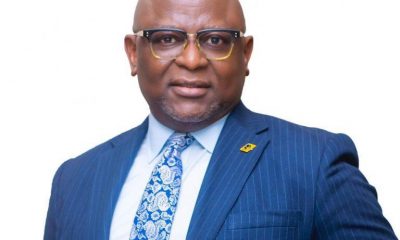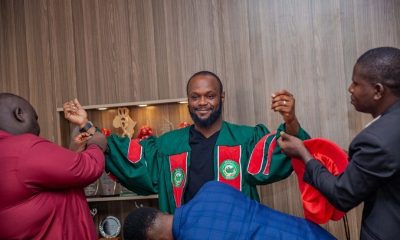Business
Ten Banks Pay 143 Directors N7.6bn In 2015

The directors of ten banks collected N7.6 billion as fees and allowances in 2015, representing 1.58 percent of the banks’ profitability during the year. The ten banks are Guaranty Trust Bank, Zenith bank, Access Bank, FirstBank, UBA, Union Bank, Diamond Bank, Sterling Bank, Fidelity and Wema Bank.
Analysis of financial statements of the banks for the 2015 financial year, reveal that the ten banks increased total money paid to 143 directors by 11 percent or N742 million, from N6.84 billion in 2014 to N7.58 billion in 2015.
The amount paid to the directors represents 1.58 percent of the profit before tax of the ten banks, which stood at N480 billion in 2015. The amount paid to the directors also represented 2.0 percent of total staff salaries (personnel cost) in the ten banks.
Further analysis reveals inadequate disclosures relating to directors compensation, fees and allowances to board chairmen, and salaries of chief executive officers.
For example, Wema Bank did not specify amount paid as compensation to executive directors, while Access Bank and Sterling Bank failed to disclose money paid to their chairmen and chief executive officers.
Total board expenses GTBank led the ten banks, with N1.25 billion paid to its 14 directors in 2015, up from N1.2 billion in 2014.
Zenith Bank came second, with N1.145 billion paid to 10 directors in 2015, up from N630 million in 2014.
Acess Bank and FirstBank came third and fourth respectively, with N1.08 billion and N1.05 billion paid to 14 and 17 directors respectively.
The fifth highest board expenses was incurred by UBA, which paid N603 million to its 16 directors in 2015, up from N600 million in 2014.
Others are Union Bank-N983 million, Diamond Bank-N195 million, Sterling Bank-N265 million, Fidelity Bank-N766 million and Wema Bank-N235 million Executive Compensation
The ten banks, with the exception of Wema Bank, paid N4.63 billion to 52 executive directors. This represented two percent decline from N4.72 billion in 2014.
On the average, each executive directors got N89 million in 2015, down from N91 million in 2014. FirstBank came first as its six executive directors (E.Ds) were paid N784 million, up from N694 million in 2014.
GTbank came second, with N718 million paid to six E.Ds, up from N691 million. The seven E.Ds of Access bank were paid N705 million in 2015, down from N1,12 billion in 2014.
Union Bank paid its six E.Ds N625 million in 2015, up from N542 million in 2014, while Zenith Bank paid its four E.Ds N595 million in 2015, up from N414 million in 2014.
UBA paid its six E.Ds N547 million, down from N555 million in 2014. Others were Diamond Bank with five EDs – 149 million, Sterling Bank with six EDs – N156 million, and Fidelity with six EDs – N346 million. Union Bank CEO tops pay.
Analysis of amount paid to the highest director, the Chief Executive Officer (CEOs), by eight banks reveal the CEOs of eight banks were paid N903 million as salaries and compensations.
This was 13 percent higher than the N798 million paid to the CEOs in 2014. The CEO of Union Bank received the highest pay with N208 million, representing 36 percent or N55 million increase from the N153 million earned in 2014. GTBank CEO came second earning receiving N204.9 million, up by 12 percent or N22 million from N183 million in 2014. The CEOs of UBA and Fidelity Bank came third and fourth earning N125 million and N102 million respectively in 2015, up from N116 million and N94 million in 2014. Others are FirstBank-N90 million, Zenith Bank-N78 million, Wema Bank-N70 million, and Diamond Bank-N25 million.
Shareholders call for review
Shareholders however were of the view that the amount paid to banks directors though huge and not in sync with economic realities, is necessary to prevent them from stealing depositors money, and also in view of the amount of work they have to do to generate earnings for their banks. “If the banks’ executives are well paid, the temptation of stealing depositors’ money will not arise,” stated Mr. Boniface Okezie, Chairman, Progressive Shareholders Association of Nigeria, PSAN.
“However, considering the economic downturn, I think the banks can equally cut the package they take home to reflect the present economic realities. If States Governors and Ministers are cutting their salaries, I think the banks should equally follow suit. There are some allowances for banks’ executives that need to be cut down or completely be removed. It is time for companies to tighten their belts given the global oil fall which had affected the country’s income.
So, if the economy picks up, banks can review the packages paid to their executive directors. But under normal circumstances, the banks’ executive should be well remunerated given the nature of the risk they undertake. If they are under paid, then you be begin to see all kinds of stealing and rubbery in the banks through insider collaboration”, he said.
Mr. Taiwo Oderinde, Chairman, Proactive Shareholders Association of Nigeria, PROSAN, on his part said the huge money paid to directors was unfair to shareholders. He said, “
“The banks’ executive compensations is really on the high side when you compare it to other countries. The executive directors of banks are given all kinds of allowances at the expense of depositors and shareholders. We do react on this issue when we attend
Annual General Meetings, AGMs. In some cases, we refused to approve their remunerations and ask them to go back and review it. “The problem we are having as shareholders is that in some cases we don’t have shareholders’ representation on the board. By the time they set up committee to review the remuneration you will only see executive directors taking decisions. The executive directors are really feeding on shareholder’ fund and this has to be checked by the regulators in the industry.
The executive directors have access to our funds and make use of it the way they like. I think there should be regulation in this aspect of emolument to stop these mouth watering packages.”
According to the Chairman, Renaissance Shareholders Association of Nigeria, Ambassador Olufemi Timothy, “The banks’ executive emolument is not too much considering the earnings they make for the bank. These are people who toil all day and night to see that depositors’ money is kept safely. So the high risk element should also be another great reason why they should be paid well. Even the so called Foreign Exchange, (forex ) are kept by these banks.
Furthermore, if banks’ executives are well paid the issue of stealing or fraudulent practices would be drastically reduced or even eliminated. I believe the packages for executive directors are not too much given the volume of work they do and the income they make for the institutions.”
“My position on this issue is that it should be looked at on the contribution they bring to the organisation”, stated, Mr. Nonah Awoh, a shareholder activist. “ It is not how big or how small the packages are, the concern should be on the equity remuneration of employees.
What is the disparity between the Chief Executive Director and other senior management? If the differential is too high, then it is not good for the organisation. Banks should be careful if fixing remuneration so that it does not affect what they are giving to shareholders in form of returns on investment”, he said.
Source: Vanguard
Business
Nigeria’s Inflation Drops to 15.10% as NBS Reports Deflationary Trend

Nigeria’s headline inflation rate declined to 15.10 per cent in January 2026, marking a significant drop from 27.61 per cent recorded in January 2025, according to the latest Consumer Price Index (CPI) report released by the National Bureau of Statistics.
The report also showed that month-on-month inflation recorded a deflationary trend of –2.88 per cent, representing a 3.42 percentage-point decrease compared to December 2025. Analysts say the development signals easing price pressures across key sectors of the economy.
Food inflation stood at 8.89 per cent year-on-year, down from 29.63 per cent in January 2025. On a month-on-month basis, food prices declined by 6.02 per cent, reflecting lower costs in several staple commodities.
The data suggests a sustained downward trajectory in inflation over the past 12 months, pointing to improving macroeconomic stability.
The administration of President Bola Ahmed Tinubu has consistently attributed recent economic adjustments to ongoing fiscal and monetary reforms aimed at stabilising prices, boosting agricultural output, and strengthening domestic supply chains.
Economic analysts note that while the latest figures indicate progress, sustaining the downward trend will depend on continued policy discipline, exchange rate stability, and improvements in food production and distribution.
The January report provides one of the clearest indications yet that inflationary pressures, which surged in early 2025, may be moderating.
Bank
Alpha Morgan to Host 19th Economic Review Webinar

Alpha Morgan to Host 19th Economic Review Webinar
In an economy shaped by constant shifts, the edge often belongs to those with the right information.
On Wednesday, February 25, 2026, Alpha Morgan Bank will host the 19th edition of its Economic Review Webinar, a high-level thought leadership session designed to equip businesses, investors, and individuals with timely financial and economic insight.
The session, which will hold live on Zoom at 10:00am WAT and will feature economist Bismarck Rewane, who will examine the key signals influencing Nigeria’s economic direction in 2026, including policy trends, market movements, and global developments shaping the local landscape.
With a consistent track record of delivering clarity in uncertain times, the Alpha Morgan Economic Review continues to provide practical context for decision-making in a dynamic environment.
Registration for the 19th Alpha Morgan Economic Review is free and can be completed via https://bit.ly/registeramerseries19
It is a bi-monthly platform that is open to the public and is held virtually.
Visit www.alphamorganbank to know more.
Business
GTBank Launches Quick Airtime Loan at 2.95%

GTBank Launches Quick Airtime Loan at 2.95%
Guaranty Trust Bank Ltd (GTBank), the flagship banking franchise of GTCO Plc, Africa’s leading financial services group, today announced the launch of Quick Airtime Loan, an innovative digital solution that gives customers instant access to airtime when they run out of call credit and have limited funds in their bank accounts, ensuring customers can stay connected when it matters most.
In today’s always-on world, running out of airtime is more than a minor inconvenience. It can mean missed opportunities, disrupted plans, and lost connections, often at the very moment when funds are tight, and options are limited. Quick Airtime Loan was created to solve this problem, offering customers instant access to airtime on credit, directly from their bank. With Quick Airtime Loan, eligible GTBank customers can access from ₦100 and up to ₦10,000 by dialing *737*90#. Available across all major mobile networks in Nigeria, the service will soon expand to include data loans, further strengthening its proposition as a reliable on-demand platform.
For years, the airtime credit market has been dominated by Telcos, where charges for this service are at 15%. GTBank is now changing the narrative by offering a customer-centric, bank-led digital alternative priced at 2.95%. Built on transparency, convenience and affordability, Quick Airtime Loan has the potential to broaden access to airtime, deliver meaningful cost savings for millions of Nigerians, and redefine how financial services show up in everyday life, not just in banking moments.
Commenting on the product launch, Miriam Olusanya, Managing Director of Guaranty Trust Bank Ltd, said: “Quick Airtime Loan reflects GTBank’s continued focus on delivering digital solutions that are relevant, accessible, and built around real customer needs. The solution underscores the power of a connected financial ecosystem, combining GTBank’s digital reach and lending expertise with the capabilities of HabariPay to deliver a smooth, end-to-end experience. By leveraging unique strengths across the Group, we are able to accelerate innovation, strengthen execution, and deliver a more integrated customer experience across all our service channels.”
Importantly, Quick Airtime Loan highlights GTCO’s evolution as a fully diversified financial services group. Leveraging HabariPay’s Squad, the solution reinforces the Group’s ecosystem proposition by bringing together banking, payment technology, and digital channels to deliver intuitive, one-stop experiences for customers.
With this new product launch, Guaranty Trust Bank is extending its legacy of pioneering digital-first solutions that have redefined customer access to financial services across the industry, building on the proven strength of its widely adopted QuickCredit offering and the convenience of the Bank’s iconic *737# USSD Banking platform.
About Guaranty Trust Bank
Guaranty Trust Bank (GTBank) is the flagship banking franchise of GTCO Plc, a leading financial services group with a strong presence across Africa and the United Kingdom. The Bank is widely recognized for its leadership in digital banking, customer experience, and innovative financial solutions that deliver value to individuals, businesses, and communities.
About HabariPay
HabariPay is the payments fintech subsidiary of GTCO Plc, focused on enabling fast, secure, and accessible digital payments for individuals and businesses. By integrating payments and digital technology, HabariPay supports innovative services that make everyday financial interactions simpler and more seamless.
Enquiries:
GTCO
Group Corporate Communication
[email protected]
+234-1-2715227
www.gtcoplc.com
-

 celebrity radar - gossips6 months ago
celebrity radar - gossips6 months agoWhy Babangida’s Hilltop Home Became Nigeria’s Political “Mecca”
-

 society6 months ago
society6 months agoPower is a Loan, Not a Possession: The Sacred Duty of Planting People
-

 society5 months ago
society5 months agoReligion: Africa’s Oldest Weapon of Enslavement and the Forgotten Truth
-

 news6 months ago
news6 months agoTHE APPOINTMENT OF WASIU AYINDE BY THE FEDERAL GOVERNMENT AS AN AMBASSADOR SOUNDS EMBARRASSING










You must be logged in to post a comment Login